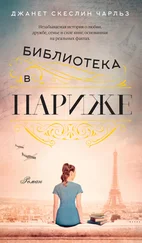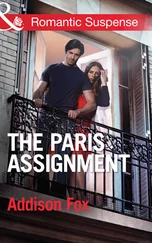Odile regarded the ladies who were pouring themselves some coffee. She joined them at the percolator and picked up the pitcher of cream.
“Invigorating sermon today,” she told them.
Smiling tremulously, Mrs. Ivers said, “Indeed it was.”
“Father was inspired,” Mrs. Murdoch added, holding out her cup.
Odile poured the cream.
ON THE MORNING of graduation, I put on my beret and Gunne Sax dress, grabbed my speech, and went to Odile’s. On the lawn, robins were pecking at the ground. You were almost a Robin. Be brave. Oh, Mom, I’ve tried…
Odile was as excited as I was for graduation. She’d even replaced her tatty red belt with a stylish black one.
“ Très belle ,” I said.
She blushed. “Read me your speech.”
I pretended to be on the stage. “People say that teens don’t listen. Well, we do. We hear what you say and what you don’t. Sometimes we need advice, but not always. Don’t listen when someone tells you not to bother a person—reach out to make a friend. People don’t always know what to do or say. Try not to hold that against them; you never know what’s in their heart. Don’t be afraid to be different. Stand your ground. During bad times, remember that nothing lasts forever. Accept people for who they are, not for who you want them to be. Try to put yourself in their shoes. Or, as my friend Odile would say, ‘in their skin.’ ”
She beamed at me. “You hold so many people in your heart.”
I hugged her. She felt little, like a hummingbird.
Ellie came with the camera, and Odile insisted on reapplying lipstick before posing with me. Then it was time. The boys wanted Odile to sit in the “way-back” of the station wagon with them. Ellie and Grandma Pearl sat in the middle. Dad let me drive. He didn’t even offer his usual advice à la Don’t run over the kids playing on the sidewalk .
At school, Mary Louise, already in her gown and mortarboard, put a black tassel on my beret. In the gym, our class of fifty was seated in the front rows. Like heavy heads of wheat whispering to each other right before harvest, our murmurs rippled. I glanced back, to friends and family who’d come to support us. The town was always behind us. They were already behind us. This was goodbye. This was hello. I was done, I could leave. This was what I had wanted for years: out. And yet…
When I gave my speech, my voice trembled. Scanning the audience, I saw Dad’s proud expression, and added, “Finally, some advice from a banker’s daughter: find your passion, but make sure you have a job that pays the bills.” Everyone laughed. The band played “Only the Young” by Journey. One by one, each student’s name was called out, and we collected our diplomas at the podium. Afterward, with a roar of excitement, we threw our mortarboards into the air. Mary Louise and I hugged. A door had been thrown wide open.
At home, Joe, Benjy, and I tumbled out of the car, and the adults followed. Friends arrived for my party, and Ellie herded them into the house. “Carol Ann made the cake, chocolate of course, you know Lily!”
I looked at Odile. “A French lesson?”
“A quick one.”
At her kitchen table, I was glad to have Odile to myself, just like always. She handed me an envelope. Inside was a plane ticket to Paris and a black-and-white postcard. I hugged her. “I can’t believe it!” I examined the ticket. There was only one.
“Where’s yours?” I asked. “Aren’t you coming?”
“Not this time.”
I read the card. “To Lily, for your summer, with all my love.” Paris. It didn’t seem possible. Where would I stay? With my dorm room and orientation session, New York was simple in comparison. But Paris? I didn’t know anyone. Where would I meet people?
When I turned over the card and saw the picture, the answer became clear. In front of a majestic old mansion, there was a pebbled path bordered by pansies or maybe petunias. Standing inside, looking out the window, was a woman in white whose face was hidden by the sweeping brim of her hat. Underneath were the words “American Library in Paris, Open daily.”
AUTHOR’S NOTE
In 2010, when I worked as the programs manager at the American Library in Paris, my colleagues Naida Kendrick Culshaw and Simon Gallo told me the story of the courageous staff who kept the ALP open during World War II. Naida curated an exhibit about the Library during and after the war, consulting with librarians as far away as Boise, Idaho. She is brilliant, and I think of her as my Miss Reeder. Simon has been with the Library for fifty years and knows everything about the ALP. In addition to sharing his knowledge, he went over all of the Dewey Decimal numbers in this book. The numbers are the ones used today, not in 1939. He explained that each library has its own way of classifying books.
I am amazed by the bravery and dedication of the librarians at the ALP during World War II. Traits that continue in the staff today. Researching the novel took several years. During this time, director Audrey Chapuis and assistant director Abigail Altman were extremely supportive, sharing stories, documents, and contacts. I met Boris Netchaeff’s children, Hélène and Oleg. From them, I learned of Boris’s experience in the military as well as information about his family. Boris’s wife, Anna, was a countess, Comtesse (née) Grabbé; Boris did not hold a title but his ancestors were all titled princes or counts. When Anna and Boris left Russia, they left everything behind. Hélène was mentioned in the The Paris Library —she was in the apartment when the Gestapo burst in and shot her father. She wrote: “During my childhood I spent many days at the American Library… I was only a few months old when Papa carried me to the library… I still remember the sound of the beautiful parquet that creaked or crunched when someone walked fast, or the smell of books, and other details such as closed rooms where I was not allowed to go. I wondered why, and I still think that there might be people who were hidden…” The Library used every available square inch of space, so Hélène’s comment made me wonder if the librarians hid Jewish subscribers during the war.
Boris worked at the Library until the age of sixty-five. In 1982, he died at the age of eighty. Hélène said he was “ increvable ” (relentless or puncture-proof), despite being shot in the lung three times by the Gestapo and inhaling a pack of Gitanes per day.
When Miss Dorothy Reeder returned to the States, she raised money and awareness for the Red Cross in Florida. She then worked at the Biblioteca Nacional in Bogotá, Colombia, before rejoining the staff at the Library of Congress. Thanks to the American Library Association Archives, Miss Reeder’s top-secret report on life in Paris during the war is available online. I am grateful to Cara Bertram and Lydia Tang of the ALA Archives for their help. It was a pleasure to read Miss Reeder’s correspondence and to share it with you in this book. My favorite letter was to her colleague Helen Fickweiler. “One of the hardest things I have ever had to do is ask you and Peter to leave the Library and go back home. I know, however, it is the only right and just decision and both my head and heart will function much easier the day I know you are safe and sound in New York.
“Words cannot express my deep gratitude for your loyalty and devotion in staying with us through such difficult and trying times. Your work has always been excellent, and without your knowledge and efficiency, I doubt if we would be in a position to carry on.”
Miss Reeder mentions the money that Helen should receive from the Library fund in New York when she arrives—one hundred dollars, the equivalent of a month’s salary—and the letter of recommendation she will also receive. The Directress closes her letter with “As for you, if ever I have a personnel, no matter where I am, you shall be first on my list of coworkers, dear Helen, how can I ever thank you, or tell you what I feel.”
Читать дальше
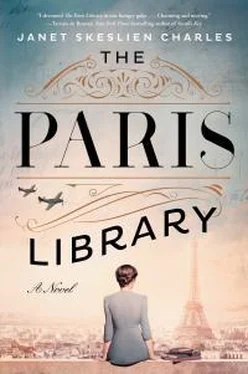
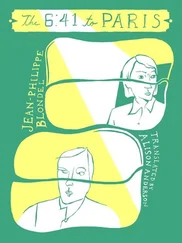
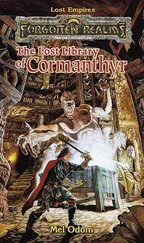
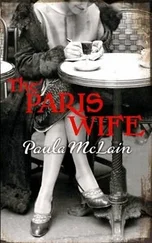


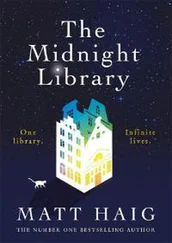
![Джанет Скеслин Чарльз - Библиотека в Париже [litres]](/books/391555/dzhanet-skeslin-charlz-biblioteka-v-parizhe-litres-thumb.webp)
